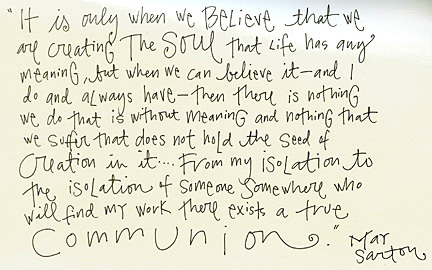
Help us to be ever faithful gardeners of the spirit, who know that without darkness nothing comes to birth, and without light nothing flowers.
May Sarton
Let the space between your thoughts expand. Notice the calm, open silence behind the words and emotions in your mind. Let those cloudy thoughts clear, leaving only open space. Breathe into that space. With each breath, take in the space around your body. It is part of you. You are part of it. Flow into it.
Prism colors of broken light roam the stillness of a quiet pool, a murmuring rainbow of forgiveness and compassion. Purple cradles your tears and opens your compassionate heart. Blue gives you confidence. Red fires your passions. Orange tickles joy. Green calms you. Yellow offers forgiveness. Drop your thoughts and fears into the pool and watch them disappear into its cool darkness.
Soft willow branches wait patiently in their free falling fountain as you let fears flow from you. You let your limbs go limp and droop down to rest in the soft, mossy grass surrounding the pool. You flow into you.
Now jump into the pool and splash everyone around you!

